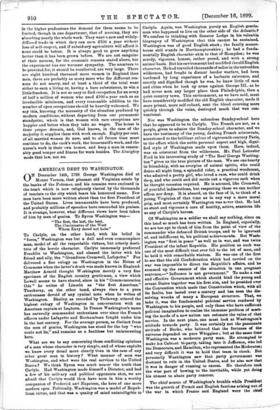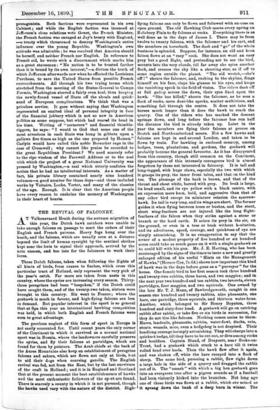AMERICA'S DEBT TO WASHINGTON.
ON December 14th, 1799. George Washington died at Mount Vernon, that pleasant old Virginian estate by the banks of the Potomac, and his remains were enclosed in the tomb which is now religiously visited by the thousands of tourists to the city which bears his honoured name. Few men have been more written about than the first President of the United States. Lives innumerable have been produced, and probably millions of speeches have resounded his praises. It is strange, however, what different views have been taken of him by men of genius. To Byron Washington was—
"The first, the last, the best, The Cincinnatus of the West Whom Envy dared not hate."
To Carlyle, on the other hand, with his belief in "force," Washington was but a dull and even commonplace man, model of all the respectable virtues, but utterly desti- tute of the heroic character. Carlyle immensely preferred Franklin to Washington, and classed the latter with his friend and ally, the " Grandison-Cromwell, Lafayette." Fox delivered a fine eulogy on Washington in the House of Commons when the latter's death was made known in England. Matthew Arnold thought Washington merely a very fine specimen of the English country gentleman, a view which Lowell seems to have shared, since in his " Commemoration Ode " he writes of Lincoln as "the first American." Thackeray, on the other hand, always rises to a pure enthusiasm devoid of any cynical note when he writes of Washington. Shelley. as recorded by Trelawny, uttered the highest eulogy of Washington in conversation with an American captain at Leghorn. In France Washington's name has naturally commanded enthusiasm ever since the French officers under Lafayette and Rochambeau fought under him in the last century. For the average person, as distinct from the men of genius, Washington has stood for the boy "who coula not lie," and remains as a faultless but uninteresting hero.
What are we to say concerning these conflicting opinions of a man whose character is very simple, and of whose exploits we know every detail more clearly than in the case of any other great man in history ? What manner of man was Washington, and what were his real services to the United States ? We think Byron was much nearer the truth than Carlyle. Had Washington made himself a Dictator, and had a few of his military and political opponents shot, we are afraid that Carlyle would then have seen in him a worthy companion of Frederick and Napoleon, the hero of one more modern epos. Politically, Washington was a model of Repub- lican virtue, and that was a quality of mind unintelligible to Carlyle. Again, was Washington purely an English gentle- man who happened to live on the other side of the Atlantic ? We confess to thinking with Senator Lodge in his valuable biography of Washington that this cannot be sustained.
Washington was of good English stock ; the family manor- house still stands in Northamptonshire ; he had a funda- mentally English character akin to that of Hampden; he was sturdy, vigorous, honest, rather proud, and with a strong animal basis. But his environment had modified theoldEnglish character. Hehad travelled thousands of miles in the untrodden wilderness, had fought in distant border warfare, had been hardened by long experience of a barbaric existence, and courtly and dignified though he was, he knew little of men and cities when he took up arms against George III.. as he had never seen any larger place than Philadelphia, then a quiet country town. This environment, as we have said, must have considerably modified the old English character, made it more primal, more self-reliant, sent. the blood coursing more quickly through the veins, destroyed much that was con- ventional.
Nor was Washington the colourless Sunday-school hero that he appeared to be to Carlyle. The French are not, as a people, given to admire the Sunday-school character, and we have the testimony of the young, dashing French aristocrats, accustomed to the brilliant salons of eighteenth-century Paris, to the effect which the noble personal aspect and high, digni- fied style of Washington made upon them. Here, indeed, was an aristocrat from the wilderness. Mr. Paul Leicester Ford in his interesting study of "The Real George Washing- ton" gives us the true picture of the man. We see one hearty in friendship, with an overplus of animal spirits, who could dance all night long, a splendid rider, a practical woodsman, who admired a pretty girl, who loved a race, who could drink deep, and who could and did rattle out a vigorous oath when he thought occasion required. He is accused, like Cromwell, of youthful indiscretions, but respecting these we can neither affirm nor deny. It is absurd, on the face of it, to think of a young Virginian of that time as in any way a mere moral prig, and moat certainly Washington was never that. He had as stout and vigorous a core of healthy, active, sensuous life as any of Carlyle's heroes.
Of Washington as a soldier we shall say nothing, since on this head so much has been written. In England, especially, we are too apt to think of him from the point of view of the commander who defeated British troops, and to be ignorant of, and indifferent to, his political achievements. But Wash- ington was " first in peace " as well as in war, and was twice President of the infant Republic. His position as such was one of the most difficult that ever fell to the lot of man, and he held it with remarkable wisdom. He was one of the first to see that the old Confederation which had carried on the war was impossible to direct the Republic's affairs, and he summed up the essence of the situation in one pregnant sentence,—" Influence is not government." To make a real and effective Government which should bind the young and errant States together was his first aim, and he presided over the Convention which made that Constitution which, with all its faults, has lasted over a century and has seen the dis- solving wrecks of many a European structure. That, we take it, was the fundamental political service rendered by Washington to his people, and only those who have sufficient political imagination to realise the immense problem of meet- ing the needs of a new nation can estimate the value of that service. In the next place, one must look at Washington's attitude towards party. It was certainly not the passionate attitude of Burke, who believed that the fortunes of the universe depended on pure Whiggism; but at the same time Washington was a moderate party man. He attempted to make his Cabinet bi-party, taking into it Jefferson, who led the Democrats, and Hamilton, who represented the Moderates; and very difficult it was to hold that team in check. Bat personally Washington saw that party government was destined to rule in the United States, and he also saw that it was in danger of running to excess. He therefore took the wise part of bowing to the inevitable, while yet doing his utmost to abate party rancour.
The chief source of Washington's trouble while President was the growth of French and English faotions arising out of the war in which France and England were the chief protagonists. Both factions were represented in his own Cabinet ; and while the English faction was incensed at Jefferson's close relations with Genet, the French Minister, the French faction was enraged at Jay's treaty with England, treaty which threatened to destroy Washington's entire influence over the young Republic. Washington's own attitude was admirable ; be was resolved that America should be herself, and neither French nor English. In reference to French aid, he wrote with a discernment which marks him as a great statesman: " No nation is to be trusted farther than it is bound by its own interest,"—a dictum the truth of which Jefferson afterwards saw when he effected the Louisiana Purchase, to save the United States from possible French encroachments. All through his two trying terms which stretched from the meeting of the States-General to Campo Formio, Washington steered a fairly even keel, thus keeping the newly-found vessel of State off the shoals and quick- sand of European complications. We think that was a priceless service. It goes without saying that Washington represented an exalted ideal of personal integrity in face of the financial jobbery which is not so new in American politics as some suppose, but which had reared its head in his time. Writing of "cornerers" and financial thimble- riggers, he says: "I would to God that some one of the most atrocious in each State was hung in gibbets upon a gallows five times as high as the one prepared by Haman." Carlyle would have called this noble Berserker rage in the case of Cromwell ; why cannot like praise be accorded to the great Republican President ? We need scarcely refer to the ripe wisdom of the Farewell Address or to the zeal with which the project of a great National University was pressed by Washington,—a zeal which utterly confutes the notion that he had no intellectual interests. As a matter of fact, his private library contained nearly nine hundred volumes—a good number for those days—and these included works by Voltaire, Locke, Vertot, and many of the classics of the age. Enough. It is clear that the American people have every reason to enshrine the memory of Washington in their heart of hearts.











































 Previous page
Previous page